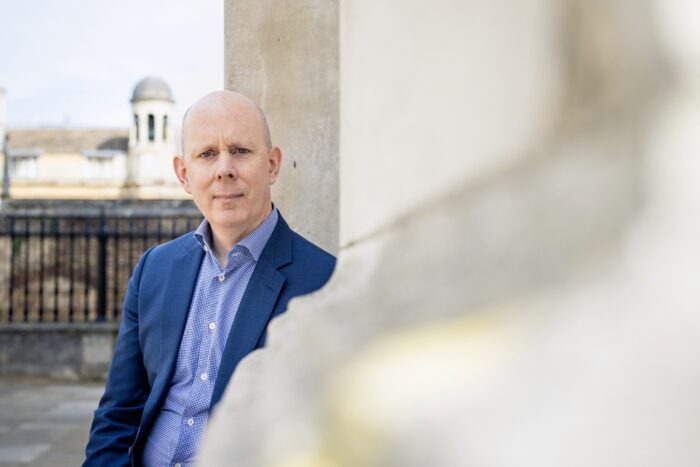A lot of people talk a lot about developing innovation in Ireland and weaning the country off its reliance on foreign direct investment. However, in many cases, the conversation is superficial, lacking real probity or depth on policies or proposals. It is, after all, easier to say that Ireland needs to up its game in innovation than actually lay out a coherent plan to make it happen.
That is what makes Dr Diarmuid O’Brien’s interview with Michael this week both interesting and important.
O’Brien spent 16 years in various leading innovation roles at Trinity College Dublin and has served on the board of the NDRC and Science Foundation Ireland. He has real-world experience too, advising on a €60 million investment fund with Atlantic Bridge Ventures and holding several senior private sector roles.
His current job is pro-vice-chancellor for innovation with the University of Cambridge. As he told Michael, it means he is “in charge of anything to do with innovation for the university”.

It is a significant position. Over the past 15 years, it has produced eight unicorns – touting valuations over £1 billion (€1.2 billion). Now, it is home to 6,000 PhDs and, as Michael explained, a vast swathe of multinationals including Apple, Microsoft and AstraZeneca, all of whom are keen to leverage benefits from the density of academic excellence.
O’Brien sat down with Michael for a wide-ranging interview that covered everything from AI to quantum computing to mindset. However, the central focus of the interview is the practical steps that Ireland should take to foster and champion innovation and develop the start-up culture here.
Here are five key takeaways from Michael’s interview with Diarmuid O’Brien.
The power of centralised innovation hubs
Throughout the interview, O’Brien emphasised that innovation hubs, like LabCentral in Boston, create a “non-linear difference” by concentrating talent and resources, making them a magnet for investors. He advocates for a similar hub in Cambridge and sees Ireland needing a centralised node for innovation.
O’Brien argues that Ireland lacks a key hub where investors can easily connect with its start-up ecosystem. Creating such a space, similar to Cambridge’s approach, is crucial for attracting global venture capital, he says.
He believes it is part of creating the right infrastructure to support innovation, namechecking things like accelerator programmes, research facilities and collaboration hubs.
“Ireland hasn’t created a node where the world can connect with its innovation proposition, and that’s what we’re trying to do here in Cambridge. And so the government has backed that,” he says.
Keeping with this theme, he had strong views on the now rescinded decision to cancel funding for the NDRC, which he says played a crucial role in Ireland’s start-up ecosystem. As a former board member, he was baffled by the move, especially given the importance of such accelerator programmes in fostering entrepreneurship and innovation.
O’Brien did credit the Government for having the “capability to take the feedback and revert the decision”.
“You don’t often see that, so I do give them credit for that,” he says.
Attitude shift
O’Brien is also a big fan of something of an unofficial slogan for Cambridge, which is that it’s “a great place to fail”. He argues that the town has attracted many interesting employers while also encouraging innovation which means it’s a place where trying to establish your own company doesn’t feel like a “life-changing risk”.
“They feel that this is a calculated investment,” he says.
Adopting this attitude in Ireland is something he would love to see, although, given the incredibly high cost of living, it may be hard to recreate it. Plus, he says the ability to fail and return to a larger business is not as prevalent in Ireland.
“I think that’s probably a big aspiration I will be trying to encourage, is to get that sense of mindset there,” he adds. “You can’t begrudge a graduate coming out meaning to take a well-paid job, but I do feel that we should be providing a capacity for those people to feel that they can leave those jobs and do something exciting that would be a success.”
The need to build up indigenous tech
Throughout his conversation with Michael, O’Brien repeatedly cites the threat that Ireland faces due to its over-reliance on FDI. He stresses throughout that FDI is a very good thing, something Ireland is “world-class” at and something that should continue to grow.
But he adds that this should be done in conjunction with the stimulation of the Irish indigenous tech sector, which should have the ambition to match the scale of the FDI industry.
Investing heavily in research is one way of addressing this gap, as well as getting big tech to invest more in its own local R&D. The need for this will only be amplified by Ireland’s diminishing tax proposition where the country will move from its low-tax rate being a differentiator to a strength.
He says that the indigenous sector can be built up alongside a thriving FDI sector. He says that the reason why companies like AstraZeneca or Danaher move to Cambridge is because they “like the idea of being beside and adjacent to very innovative early-stage companies”.
“It means they can sometimes acquire them, sometimes partner with them, sometimes recruit the talent from them,” he says. “It enriches the environment in which they’re operating in.”
AI, quantum and China
O’Brien acknowledges that competing in sectors like AI and quantum computing is challenging for smaller countries like Ireland. It is a scale issue — the investment required is massive.
However, if Ireland is to maintain relevance and avoid dependency on other nations, he says it is something we need to aspire towards.
“You see at the moment, even in AI, there’s a real concentration of power in a small amount of organisations, a small amount of places, and we have to be able to add value to that to continue to be relevant. I think that’s quite important,” he argues.
He points to China, whose approach to innovation is characterised by aggressive state investment, a vast talent pool, and a fast-moving commercialisation process.
The way O’Brien sees it, Ireland can learn from this model by fostering stronger government-industry collaboration and accelerating its own innovation cycles.
“If you’re completely reliant on importing this technology, AI, quantum, from other environments, that’s a really economically and socially dangerous place to put a country,” he says. “I think Ireland needs to think similarly, but at the scale that we can operate at.”
Tax, competitiveness and complacency
While he acknowledges that Ireland’s low-tax status has been a significant asset, O’Brien argues that it may no longer be a major differentiator in attracting multinational companies.
Instead, O’Brien believes that Ireland’s focus should shift toward building a strong innovation and talent proposition.
“What’s now at play is our talent and innovation proposition, and we’ve got to get comfortable with the idea of actually having a world-class, indigenous sector [that] will attract more investment in, not less. These things aren’t in competition. They actually amplify each other,” he says.
O’Brien says that the underlying health of the economy and the public finances offered an opportunity to derisk the country’s future.
“But I do think there is a need to take a 10, 15, 20-year view on this and make sure that we are not wasting the opportunity of this budget surplus to invest long term in building an economic model that’s going to sustain us into the future,” he says.
Elsewhere last week

Founded in the early 1950s to develop and promote the arts scene in a burgeoning republic, the Arts Council has played a key role in stimulating public interest and appreciation in the arts and, importantly, handing out grants for artistic endeavours. However, in recent days, it has been beset by controversy after details emerged of a botched €6.5 million IT project. A new arts department report provides a blow-by-blow account of what happened on the overly ambitious project. Niall lays out all the details.
Europe’s role as a super regulator has created a bounty for the disputes teams in Ireland’s major law firms. The partners give The Currency the lowdown on a year of complex court battles, big data and white-collar investigations. It was all contained in Francesca’s annual litigation survey.
Former Sonas boss Dermot Usher is on a mission to transform Cork City FC into a sustainable business, tackling ticket prices, merchandise and investment head-on. Can his vision reshape the future of Irish football? He spoke with Johnny Ward.
After five years as editor of The Sunday Independent, Alan English talked to Tom about the highs, challenges and future of journalism — plus why he chose to step away from one of Ireland’s most influential newsrooms.
Ireland has a new unicorn. SoftBank and an arm of Goldman Sachs have backed the Dublin tech company Tines in its $125 million Series C round, valuing the company at $1.1 billion. CEO Eoin Hinchy told Jonathan about the rapid evolution of its product.


